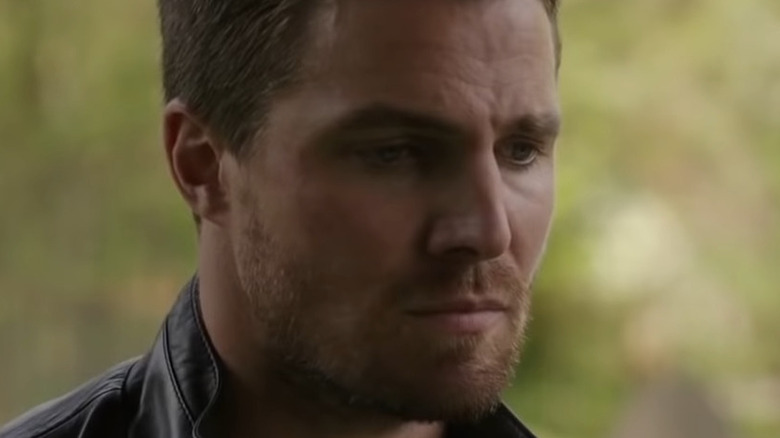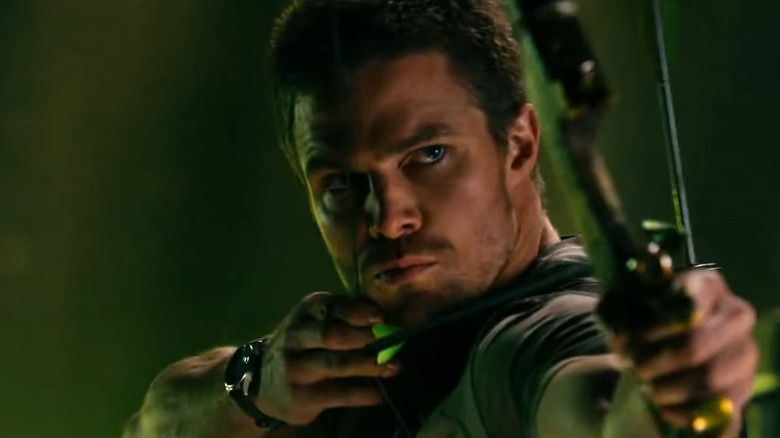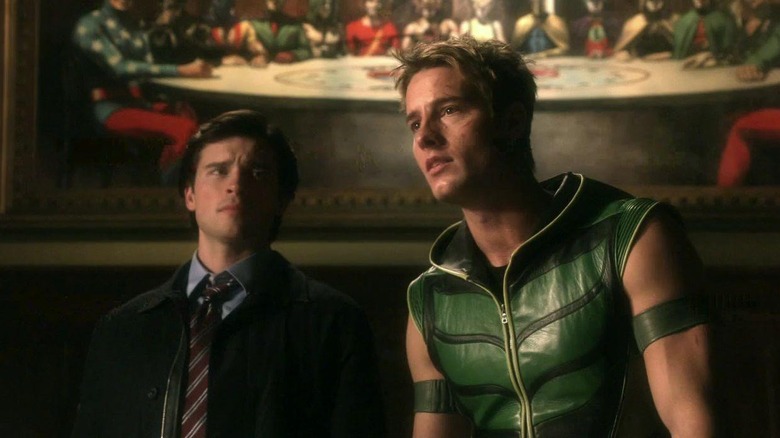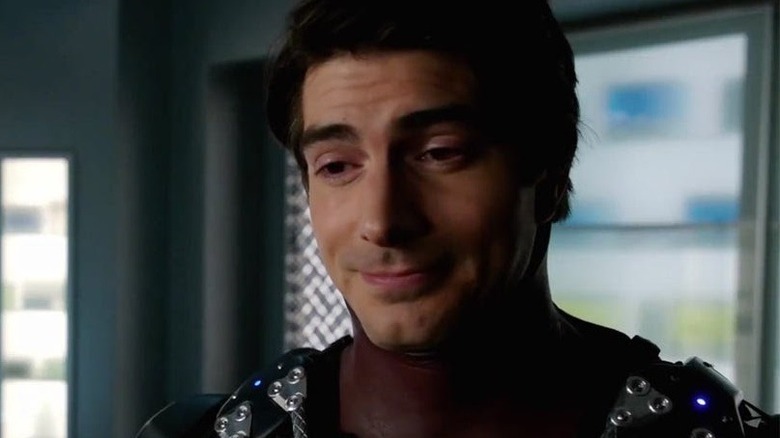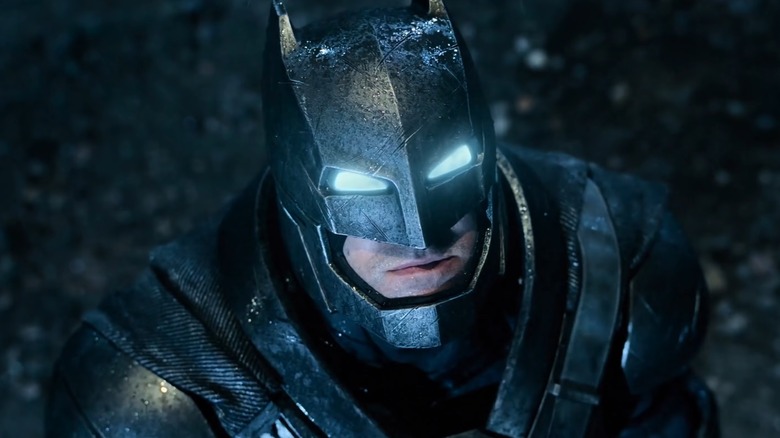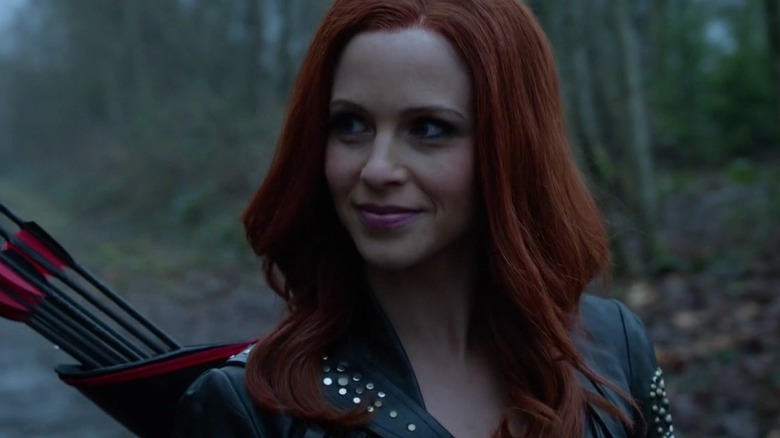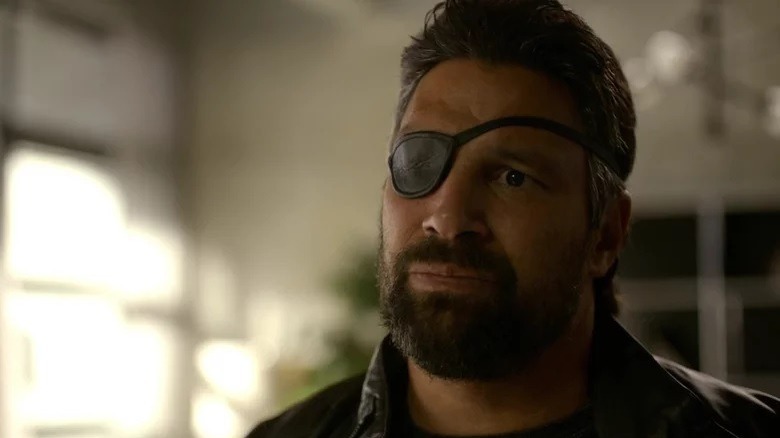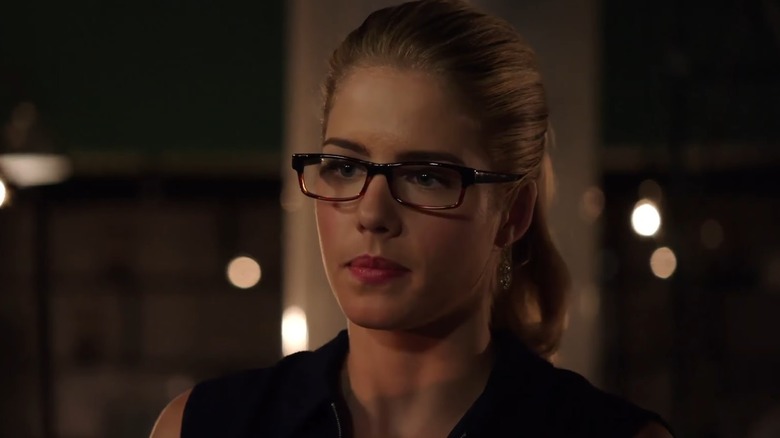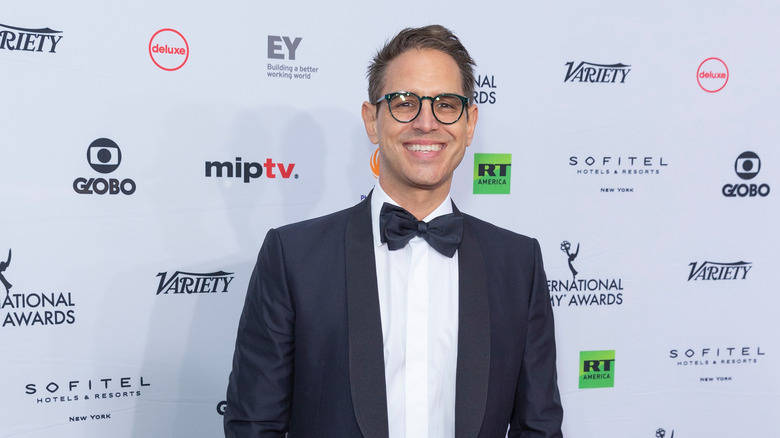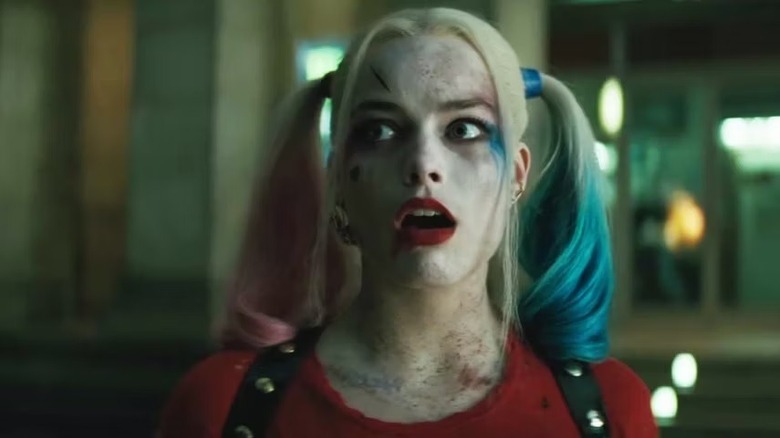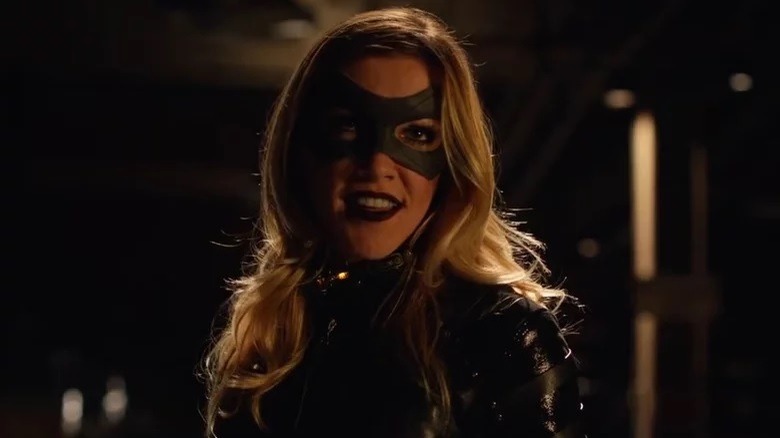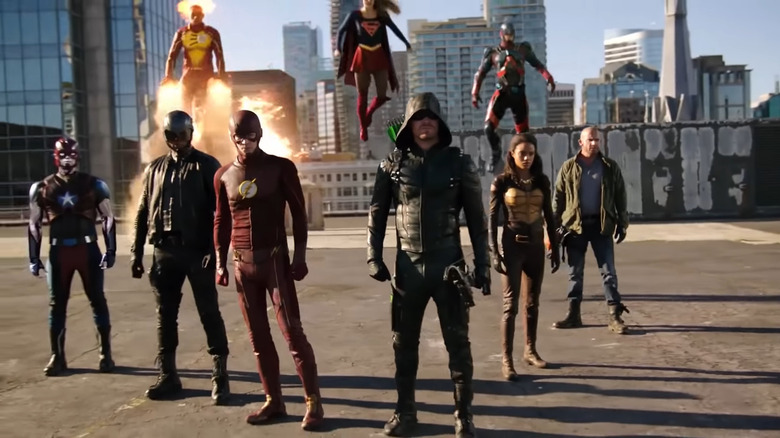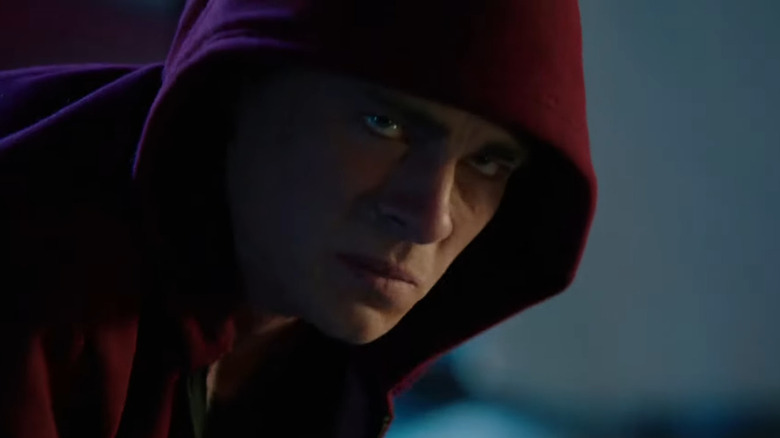The Untold Truth Of Arrow
In 2012, Oliver Queen set out to save his city, but he ended up stealing our hearts. No one knew that "Arrow" would be the start of a new era, as its success helped to kickstart a golden age of superhero television. The Arrowverse branched out in different directions, as The CW created spinoff shows such as "The Flash," "Batwoman," "Black Lightning," and "Legends of Tomorrow." Make no mistake about it — Green Arrow crawled so that Beebo could run.
Like all good things, "Arrow" had to come to an end. Fortunately, it closed out on its own terms and not because some network executive got a trigger finger during renewal season. However, Oliver's journey to Star City by way of the island Lian Yu certainly wasn't without its challenges and backstage drama. From one actor disliking creative choices made with their character to another leaving the show because of a co-star, here is the merciless untold truth of "Arrow."
Stephen Amell wanted to quit much earlier
After 170 episodes across eight seasons, "Arrow" came to an end in 2020. It was a remarkable and celebrated run; the show launched the entire Arrowverse timeline and was arguably the heart of superhero television throughout its considerable tenure. It would have ended a little bit sooner if Stephen Amell had his way, though.
Appearing on the Inside of You podcast (via TV Fanatic), the actor revealed to host Michael Rosenbaum that he was ready to hang up the hood and quiver at the end of Season 7. Amell informed the powers that be of his decision; however, they convinced him to come back for a condensed Season 8 with a financial incentive and shorter filming schedule. "I looked at it, and it would have been fiscally irresponsible for me to say no. Just fiscally irresponsible," Amell said, before adding that he enjoyed his time filming Season 8, especially with the sweet offer on the table. "I had a blast, but I was there for the money. More so than I had ever been."
Arrow never wanted Justin Hartley as Oliver Queen
When the news broke that a Green Arrow project was in active development, some fans presumed that Justin Hartley would be reprising his role as Oliver Queen in a "Smallville" spinoff. It's understandable, especially considering how popular his character was on the show and how his "Aquaman" pilot sank to the bottom of the ocean in 2006. Hartley seemed like the logical and only choice to lead this new project, so imagine the surprise when it was announced that he wasn't even in the running.
"Arrow" co-creator Marc Guggenheim discussed why Hartley was never considered at a press conference (via Canada.com). "We wanted to chart our own course, our own destiny," said Guggenheim. "I don't think we felt any desire or need to let the ground lie fallow, especially since this is such a different take." But Hartley's time in the superhero game wasn't done, as he went on to voice Superman in 2021's "Injustice," the animated film adaption of the popular video game.
Brandon Routh was hesitant to play Ray Palmer
Brandon Routh has a complicated history with live action comic book adaptations. In 2006, he portrayed the Man of Steel in director Bryan Singer's "Superman Returns." While Routh's performance was generally well received by critics and fans, the film struggled to capture the imagination or set the box office on fire, proving to be a one-and-done deal for this iteration of Superman. Naturally, Routh was apprehensive of jumping back into the genre after the disappointment of "Superman Returns" almost ended his career, but he eventually accepted the part of Ray Palmer, aka The Atom, in "Arrow."
"I was a little wary at first," Routh admitted to SuperHeroHype. "I never really thought that I'd play another hero in the DC world having played kind of the pinnacle of them all. But it's been a lot of fun bringing Ray to life." Thanks to the success of the Arrowverse, Routh received another chance at portraying the Man of Steel in the "Crisis on Infinite Earths" crossover. "Superman Returns" never got a sequel, but at least Routh got a proper sendoff as Supes that wasn't possible before.
Oliver Queen was meant to inspire Batman
While the Arrowverse launched a wider universe that introduced other DC characters such as Supergirl, the Flash, and Superman, the Dark Knight never appears on "Arrow." He's alluded to on the show in a winking-at-the-audience type of way numerous times; however, Batman brooded on a gargoyle in a Gotham City far beyond of the reach of any CW cameras.
Of course, that didn't stop "Arrow" executive producer Marc Guggenheim from dreaming about how Batman could be tied to the show. Appearing on the Fake Nerd Podcast (via SyFy Wire), he revealed his original idea for an "Arrow" endgame, stating that Oliver Queen would have died but his legacy would have lived on through other heroes. One of the scenes would have cut to a different city with a criminal being chased and punched by a vigilante. "And this pair of black boots would come down right in front of him, and there'd be a flutter of a scalloped cape, and the voice over would say something along the lines of 'Oliver Queen inspired a whole new generation of vigilantes,'" Guggenheim said. "The implication of course being that he inspired Batman."
Amy Gumenick auditioned for the show several times
Amy Gumenick was no stranger to The CW when she appeared as Carrie Cutter, aka Cupid, in "Arrow." She had already appeared as a young Mary Winchester in "Supernatural," another fan-favorite series, years before. However, Gumenick revealed that she could have appeared on the DC show much earlier than she did, even under several different guises.
"I auditioned for the show several times," she told The Wrap. "I first auditioned when they were casting the pilot, actually, for Katie Cassidy's role." Cassidy was also a "Supernatural" alumnus. It would have been interesting to see what Gumenick would have done differently had she secured the part of Laurel Lance, aka Black Canary. While Gumenick might not have received the first, second, or even third role she auditioned for, she proved that persistence is key when someone is determined to land a role on a popular ongoing television show.
Manu Bennett pushed to protect the integrity of Deathstroke
Even though "Arrow" is based on characters established in the DC Universe, it takes many creative liberties with its various interpretations and storylines. Slade Wilson, aka Deathstroke, underwent a few significant changes, as his Arrowverse origin story differs from the original comic book version. In 2015, Manu Bennett told The Music that he was disappointed by the treatment of his character on the show and that's why the actor left "Arrow." "I think Deathstroke had a lot of possibilities with 'Arrow,' but I think they took it in the wrong direction," he said. "I think they should have honoured the Marv Wolfman character who was literally unstoppable."
When Bennett returned as Deathstroke years later, he spoke to Entertainment Weekly and explained how he had chatted to Marc Guggenheim about how to preserve the integrity of Deathstroke. He mentioned how paramount it was to maintain the creators' original vision and to please the fans with a comics-accurate representation. Bennett believed that the return of Deathstroke was more in line with what he wanted than what he was doing before.
Felicity Smoak was meant to be a one-episode deal
One of the breakout characters of "Arrow" was Felicity Smoak. While she's drastically different from the version introduced in DC Comics, she became a crucial part of Team Arrow and Oliver Queen's main love interest on the show. For actress Emily Bett Rickards, it was a star-making role. Yet, things could have been entirely different for Rickards' career if the original plan for Felicity hadn't changed.
"As time goes on, I've heard many stories, but as far as I knew, I was being signed for two scenes — one day of acting," Rickards told Refinery29 about how small the part was originally envisioned to be. "And I was freaking out because it was so exciting." Rickards explained how Stephen Amell spoke positively of their chemistry and interactions to the producers, and members of the television media reportedly asked more questions about Felicity than anyone expected. All of this feedback inspired the showrunners to bring her back and make her an integral part of the story.
Greg Berlanti made one request for Arrow after the Green Lantern debacle
"Arrow" wasn't co-creator Greg Berlanti's first rodeo with DC properties. He received both writing and producing credits on 2011's "Green Lantern," but he was fired from the movie before it entered production. The experience still disappointed the highly acclaimed showrunner and left the curse of the Emerald Knight hanging over his head. Because of his power ring-related disillusionment, he made one specific request when he took on "Arrow."
"My only request was to let us do it our way because I was so heartbroken by what had happened [on 'Green Lantern']," Berlanti told The Hollywood Reporter. "Being a part of something like that when you've loved those characters your whole life, and thinking you're not going to really get a chance to participate before you even start was very [tough]." Nowadays, Berlanti is much better known for the Arrowverse than anything remotely connected to the infamously terrible "Green Lantern" movie, though he could get a chance at a do-over through his involvement with the "Green Lantern" HBO Max series.
Why Arrow couldn't use Harley Quinn
In Season 2 of "Arrow," the Suicide Squad is introduced. There's a brief cameo of Harley Quinn in Episode 16, but she's never mentioned by name or fully shown to the audience, making her appearance one of the most notable among the handful of unresolved "Arrow" storylines. Marc Guggenheim revealed to Collider that Harley's presence on the show was always meant to be limited to an Easter egg. However, Willa Holland let it slip that this wasn't necessarily the case.
"We had big plans for Harley," Holland said (via Digital Spy). "But I guess something came down from DC execs that told us to shut it down. I mean, we had that tease with the pigtails and the ARGUS outfit, but we'll never see it. We would love to [have] Harley in 'Arrow,' but it will never happen." Considering the first "Suicide Squad" film hit theaters a little over two years after Harley's unofficial appearance on "Arrow," it seems Warner Bros. wanted to save the character for the film. They didn't seem to have an issue with introducing different versions of Floyd Lawton and Amanda Waller ... although "Arrow" does kill both of them off in dramatic fashion.
Katie Cassidy said Arrow saved her life
There's an argument to be made that Katie Cassidy was one of the more well-known actors in the first season of "Arrow." Having appeared in the likes of "Gossip Girl," "Taken," and the "A Nightmare on Elm Street" reboot, she had a significant amount of credibility in the industry before starring as Laurel Lance. However, Cassidy wasn't in the best mental space before the role presented itself, as she revealed to Horror Geek Life.
"I was actually in a really dark place in my life at the time, a breakup," she said. "I was just not in a good headspace, so I say in a way that 'Arrow' kind of saved my life because I was just not in a good place." Cassidy added that she read the "Arrow" script and told her agents that it was the show for her, refusing to accept any other pilot scripts afterwards. Despite feeling so strongly and confidently about the part, she still had to audition. Once she officially received the role, she moved to Vancouver and the rest is history.
Stephen Amell wasn't a fan of shooting the crossovers
The Arrowverse crossovers were a treat for fans of shared universes and superheroes. Not only did they succeed in bringing popular DC Comics events into the live-action sphere, but they also managed to create a super-sized team-up extravaganza that freely used characters from the other CW DC shows. These multi-episode crossovers ignited interest across the television industry and upped the ratings for all the series participating in the events.
For Stephen Amell, he recognized how important these crossovers were to the fans, but he wasn't exactly ecstatic about the process or logistics behind them. Appearing on the Inside of You podcast (via Inverse), he explained how shooting these episodes weren't pleasant experiences, nor did they maximize the full potential of what could be done. Part of the reason was not everyone could be present for all the scenes due to scheduling conflicts. "There are lots of scenes where I'm acting and there just aren't other actors there, and that's just not an acceptable way of creating the best product from my perspective," he said. "I think it is a little disrespectful to actors and their process, speaking personally."
Colton Haynes said a co-star made him quit Arrow
In DC continuity, Roy Harper, aka Arsenal, is an important part of the Green Arrow mythology. As Oliver Queen's sidekick and trusted confidante, Roy became a fan-favorite hero and a frequent member of the Teen Titans. In the "Arrow" series, Colton Haynes played Roy and received acclaim from the fanbase for his portrayal. However, Haynes' time on the show was cut relatively short. He was only a regular for three seasons and made sporadic guest star appearances for the rest of the series.
In his autobiography, "Miss Memory Lane," Haynes disclosed the main reason for his departure from the show (via E! News). "I had walked away from my full-time job on 'Arrow' at the beginning of the year, supposedly because my contract had ended," he wrote, "but it was really because I was too depressed and I couldn't stand working with one of my castmates." Haynes never revealed the identity of the co-star who caused him to experience such a hard time on set, but that hasn't stopped the fans from speculating.
